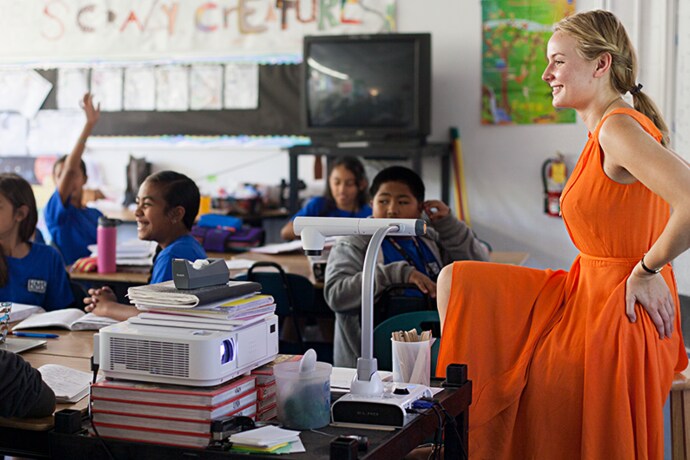What I’d Wish I’d Known

For new corps members embarking on their first days in the classroom, the ringing of the school bell may have a very different meaning than when they were students. If you’re one of those people, and you’re feeling a little anxious, you’re not alone.
There are lots of resources to help you find your footing, including your Teach For America coaches, mentors, and support network, as well as a range of other sources, online and offline. Some are inexpensive. Some are free. And some are profound insights of far more value than anything you can buy online.
We asked a few alums to reflect on what they wish someone would have told them before they entered the classroom for the first time and looked out on that sea of students eager for learning and leadership.
Arsema Assefa | Lean on Your Team
Arsema (Oklahoma ‘15) is now in her fourth year teaching kindergarten at Martin Luther King Elementary in northeast Oklahoma City.
My first year of teaching, I thought I could walk into the classroom and put on my superwoman cape. I thought I had the answers and solutions to all the problems in education.
Little did I know, that was not the case.
Being a first-year teacher was very draining because of this mindset. I can say this mindset was along the lines of thinking it was "my classroom." The name on my door, students and parents coming to my room, the district holding me accountable, etc. It all led me to believe it was all on me. I would easily get frustrated when things out of my control were affecting my teaching and thus made me feel like I had failed.
You do your part but it’s okay to ask for help and not have the answers to all of the world’s problems. I wish I had realized earlier that I had a whole team of people — not just TFA — but my whole school community who I could go to for resources.
Jason Cantanese | Create a Great Culture
Jason (Phoenix ‘12) is still teaching at the school he started at as a corps member. He also is the executive director of the Camp Cantanese Foundation, a highly successful STEAM and college prep program.
I think the most important part of any classroom is the culture. A culture is not something you can go to the store and buy. The culture largely exists because of the time and dedication the students and teachers have spent to create what their vision for the year.
I think one of the best things about our math classrooms at our school is a majority of what we do is largely student-run and student-based. So the students are seeing different problems in their community, and our task then is to come up with solutions based on our math expertise to solve those problems and to find answers to those problems.
We are nurturing their confidence. Even though they're young, that doesn't mean that they can't look at something and find a solution for it.
Elsa Mota | Journal for Insights and Perspective
Elsa (Denver ‘16) is currently a law student at Yale and taught 4th grade English in Denver during her corps experience.
One piece of advice is to journal. I wish I would have done that more during my first year, because it’s very useful to see where you were and how far you’ve come.
When you’re in the day-to-day, it’s easy to gloss over stuff.
But if you’re able to journal, you’re able to get some objectivity about your progress learning new skills.
For example, you might see how hard it was to get your lesson plan done on time in the first month, and then two months in and you're on time for everything.
It can be very uplifting to actually reflect on your progress over time and to see your expertise expand as you work through the highs and lows of each day.
Anthony Zarate | Let the Kids Lead
Anthony (Greater Chicago-Northwest Indiana ’13) taught 5th and 6th grade English in Chicago.
One of the things I wish I knew when I started was how important it is to let kids lead. To let them have a voice. And your belief as a teacher in their capacity to voice what they think and who they are is really important.
Letting students lead in the classroom and have a voice has many benefits. It enables them to be invested in what they're doing in the classroom. In practical terms, it meant that my students were involved in the process of what books we read. Asking them for feedback on how you taught a lesson. These types of ideas allow students to be involved in their own learning process. Learning that has them a lot more invested rather than just making everything teacher-led or teacher-directed.
Sarah Scheter | Know What You Don’t Know
Sarah (Los Angeles ‘18) teaches 8th grade math at Alliance Richard Merkin Middle School in Los Angeles’ Pico-Union district.
I think knowing what you don't know is really important and knowing that once you walk in on your first day of your first year of your teaching, you're not going to be the best teacher you'll ever be. When I talked to my friends at the end of the year, we all said, "Oh, my God. I was a different person—let alone a different, more experienced teacher—in September."
Seeking more great ideas
Do you have essential advice for new corps members you’d like to share? We want to hear from you at editors@teachforamerica.org.


